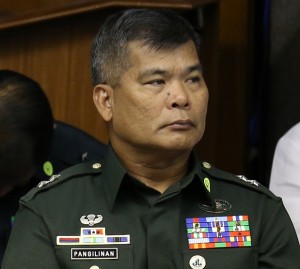Army general put peace process above SAF commandos’ safety
The commander of the Army unit in Central Mindanao put primacy to the government’s peace negotiations with Moro rebels over the lives of the Special Action Force (SAF) commandos.
This was among the telling findings of the Philippine National Police board of inquiry that looked into the bungled SAF mission to get wanted Malaysian bomb maker Zulkifli bin Hir, alias “Marwan,” and two of his trusted henchmen in Mamasapano, Maguindanao province, on Jan. 25.
One of the most compelling contents of the 128-page report was its conclusion that Maj. Gen. Edmundo Pangilinan, commander of the Army’s 6th Infantry Division, did not order artillery fire to help the SAF commandos repel the Moro rebels to protect the peace negotiations between the government and the Moro Islamic Liberation Front (MILF).
“Artillery support from the 6th Infantry Division of the Philippine Army was not delivered when needed most because (Pangilinan) considered the ongoing peace process and protocols in the use of artillery,” the board said.
“Based on records, Pangilinan took it upon himself to withhold artillery fire support in consideration of the peace process and artillery fire protocols,” it said.
It said artillery fire from the local military unit “was factored in as one of the mitigating actions of the SAF” to launch the mission.
“In consideration of the peace process, the AFP (Armed Forces of the Philippines) did not deliver the artillery fire support… and (in) the absence of compliance with the required protocol,” the report said.
Prior coordination
As part of its protocol, it said the military required “prior coordination to enable them to react and deliver the requested support.”
In one of his speeches on the Mamasapano clash, President Aquino said resigned Philippine National Police chief Alan Purisima had told him that the military was already providing artillery support to assist the SAF commandos amid the firefight with the MILF fighters after successfully taking down Marwan.
It turned out, however, that Purisima had just asked Lt. Gen. Rustico Guerrero, commander of the AFP Western Mindanao Command, for artillery fire at 7:07 a.m. of Jan. 25, or more than an hour after the gun battle between the Moro rebels and the police troopers had started.
The board said the AFP eventually sent infantry and mechanized units to help extricate the SAF commandos who were pinned down in a cornfield in Tukanalipao village.
“White phosphorous artillery rounds were fired late in the afternoon. However, by then, all of the 55th SAC (Special Action Company) lay dead except for one who was able to escape,” the board said.
Peace process uninvoked
Pangilinan could not be reached for comment on Friday, but Guerrero said that as far as he knew Pangilinan “never invoked the peace process as a reason” for not delivering the requested artillery support.
Guerrero said Pangilinan’s action was based on the “doctrinal use of artillery.”
“There must be complete information, which will be used as basis to use artillery, and this was not satisfied. It was only in the afternoon when full information was relayed. Complete information must be ensured before delivery, otherwise we would hit the SAF. If we acted without that information, we would have been at the center of the investigation now,” Guerrero said.
No instruction from Aquino
The board of inquiry said in its report that there was no “clear or decisive instruction” from the President to take the peace negotiations into account in planning the SAF mission.
It said the implications of the mission and its effects on the peace agreement and the passage of the proposed Bangsamoro Basic Law “should have been considered in the planning and execution” of the operation. With a report from Julie Alipala, Inquirer Mindanao
RELATED STORIES
Napeñas had ‘no sense of urgency’ during Mamasapano clash—military exec
Mamasapano clash: Napeñas plea sparked Pangilinan’s outburst
Military exec turns emotional after Napeñas’ acknowledgment of ‘big help’
